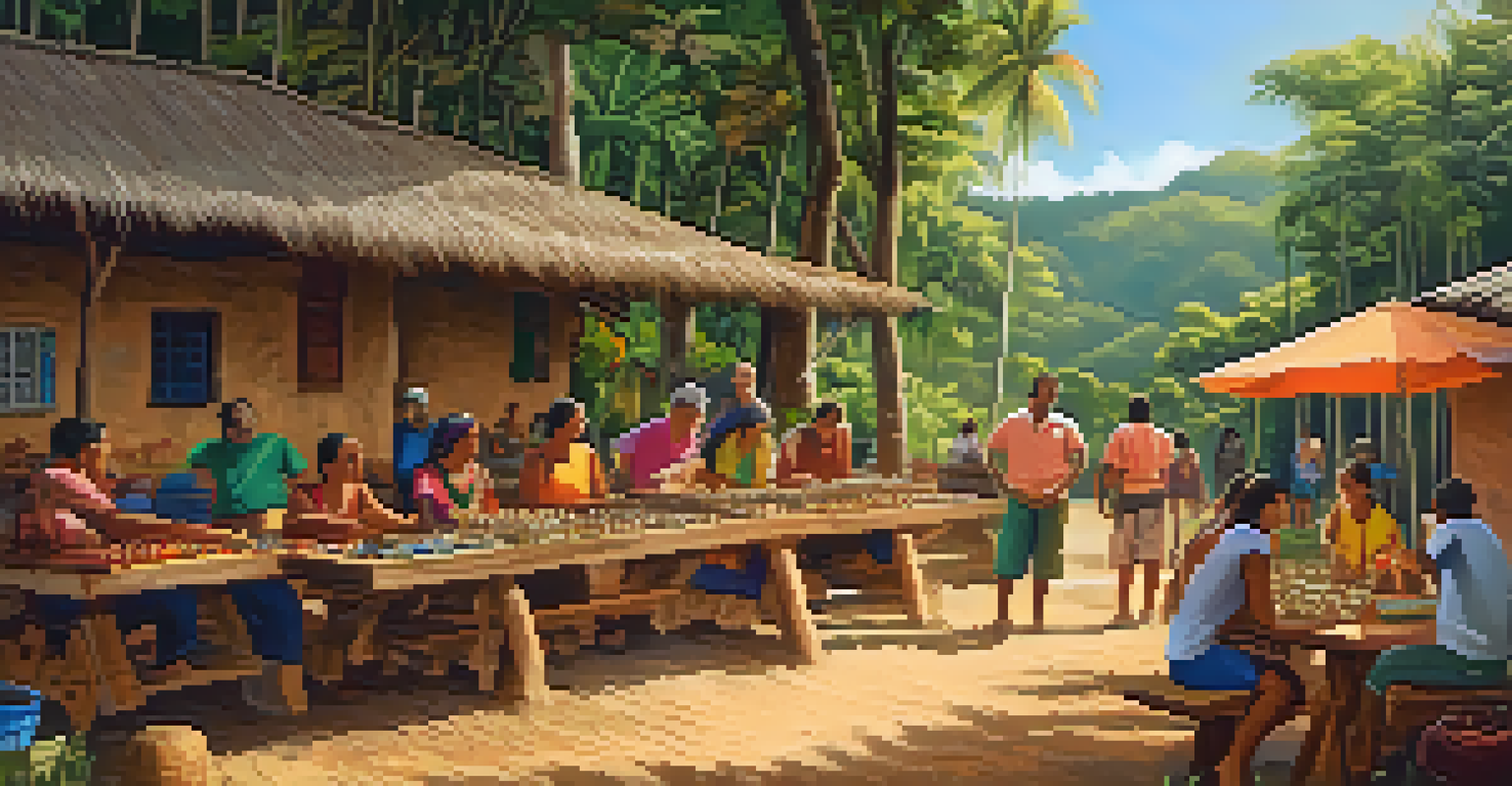The Role of Eco-Tourism in Brazil's Wildlife Conservation

Understanding Eco-Tourism and Its Importance
Eco-tourism is a responsible way to travel that emphasizes sustainability and environmental conservation. In Brazil, this approach not only offers unique experiences but also fosters a deeper connection between visitors and nature. By prioritizing the protection of ecosystems, eco-tourism helps to ensure that Brazil's rich biodiversity is preserved for future generations.
The greatest threat to our planet is the belief that someone else will save it.
Brazil is home to some of the most diverse ecosystems in the world, including the Amazon rainforest and Pantanal wetlands. Eco-tourism initiatives often focus on educating tourists about these environments, highlighting the importance of conservation efforts. This education helps travelers understand their role in preserving these natural wonders while also enjoying their beauty.
Moreover, eco-tourism can serve as a catalyst for change, encouraging local communities to engage in conservation efforts. When communities see the economic benefits of sustainable tourism, they are more likely to invest in protecting their natural resources. This creates a win-win situation: tourists enjoy a fulfilling experience, and local ecosystems are safeguarded.
Brazil's Rich Biodiversity and Its Threats
Brazil boasts an astonishing variety of wildlife, with thousands of species that cannot be found anywhere else on the planet. However, this biodiversity faces significant threats from deforestation, poaching, and habitat loss. Understanding these challenges is crucial for developing effective conservation strategies that also incorporate eco-tourism.

The Amazon rainforest, often referred to as the 'lungs of the Earth,' is particularly vulnerable to human activities. As trees are cut down for agriculture and urban development, countless species lose their habitats. Eco-tourism can play a pivotal role in addressing these issues by raising awareness and generating funds for conservation projects.
Eco-Tourism Supports Conservation
Eco-tourism fosters sustainable travel practices that help protect Brazil's diverse ecosystems and promote environmental awareness.
By showcasing Brazil's unique wildlife, eco-tourism helps to highlight the need for immediate action against these threats. Tourists who witness the beauty of endangered species are more likely to advocate for their protection, creating a ripple effect that can lead to stronger conservation policies.
The Economic Benefits of Eco-Tourism
One of the most compelling arguments for eco-tourism is its ability to boost local economies. In many regions of Brazil, eco-tourism provides a sustainable income source for communities that might otherwise rely on destructive practices. This economic incentive encourages locals to protect their natural resources rather than exploit them.
Travel is fatal to prejudice, bigotry, and narrow-mindedness, and many of our people need it sorely on these accounts.
For example, eco-lodges and guided tours create jobs and stimulate local markets. These businesses often prioritize hiring local residents, ensuring that a portion of the revenue stays within the community. This economic empowerment fosters a sense of pride and responsibility toward preserving the environment.
Additionally, a thriving eco-tourism sector attracts investment and infrastructure development, which can benefit both tourists and locals. Improved facilities, such as roads and communication networks, can enhance the overall quality of life for residents while making remote natural areas more accessible to visitors.
Community Involvement in Eco-Tourism
The success of eco-tourism in Brazil largely hinges on the active participation of local communities. When locals are involved in tourism planning and management, they are more likely to support conservation initiatives. This collaboration leads to a more sustainable approach that respects both the environment and the cultural heritage of the region.
Community-based eco-tourism projects often focus on preserving indigenous cultures and traditional knowledge. By integrating these elements into the tourism experience, visitors gain a richer understanding of the local way of life and its connection to the environment. This cultural appreciation can inspire travelers to become advocates for conservation.
Economic Boost for Local Communities
By providing sustainable income through eco-tourism, local communities are incentivized to preserve their natural resources instead of exploiting them.
Moreover, when communities see the tangible benefits of eco-tourism, such as improved infrastructure and education, they are more likely to engage in long-term conservation efforts. This creates a cycle of positive reinforcement that strengthens both the local economy and the natural environment.
Challenges Facing Eco-Tourism in Brazil
While eco-tourism holds great promise, it is not without its challenges. Overcrowding in popular eco-tourism spots can lead to environmental degradation, undermining the very goals of conservation. Striking a balance between attracting visitors and protecting natural resources is crucial for sustainable success.
Another challenge is ensuring that eco-tourism practices truly benefit local communities. There can be a temptation for outside investors to dominate the market, leaving locals with minimal profit. Establishing clear guidelines and promoting community ownership of eco-tourism projects is essential to address this issue.
Additionally, raising awareness about the importance of responsible tourism practices among travelers is vital. Educating tourists on how their actions impact the environment can help minimize negative effects and encourage a more respectful approach to nature.
Success Stories of Eco-Tourism in Brazil
There are numerous examples of successful eco-tourism initiatives in Brazil that have made a significant impact on wildlife conservation. One standout is the Pantanal region, where eco-lodges and guided tours focus on sustainable wildlife viewing. These initiatives have not only generated income for locals but also raised awareness about the importance of protecting this unique ecosystem.
Another success story is the Amazon rainforest, where community-based eco-tourism projects have empowered indigenous groups to manage their territories sustainably. By offering immersive experiences that educate visitors about their culture and environment, these communities have created a sustainable income source while preserving their ancestral lands.
Community Involvement is Key
Active participation of local communities in eco-tourism initiatives leads to better conservation outcomes and a richer cultural experience for travelers.
These success stories demonstrate that eco-tourism can be a powerful tool for wildlife conservation when implemented thoughtfully. By learning from these examples, other regions can adopt similar strategies to protect their ecosystems while providing enriching experiences for travelers.
The Future of Eco-Tourism and Wildlife Conservation
As awareness of climate change and biodiversity loss grows, the role of eco-tourism in wildlife conservation is becoming increasingly vital. Brazil, with its rich natural heritage, has the potential to lead the way in sustainable tourism practices that prioritize environmental protection. The future of eco-tourism will likely focus on innovative approaches that blend conservation efforts with authentic travel experiences.
Emerging technologies, such as virtual reality and drone monitoring, could enhance eco-tourism experiences while providing valuable data for conservation. By leveraging these tools, eco-tourism operators can offer unique insights into wildlife behavior and habitat conditions, deepening visitors' appreciation for the challenges faced by these ecosystems.

Ultimately, the future of eco-tourism in Brazil hinges on collaboration between governments, local communities, and travelers. By fostering a shared commitment to conservation, Brazil can ensure that its incredible wildlife is preserved for generations to come, creating a legacy of sustainability and respect for nature.